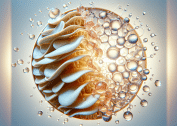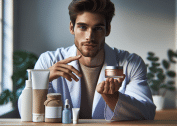Curious about the real impact of collagen on beauty and overall wellness? This in-depth guide explores the science behind collagen, the most popular sources, and tips people consider for supporting natural skin radiance and health through everyday routines.
Understanding Collagen’s Crucial Role in Skin Health
Collagen plays an essential role in maintaining skin’s structure, elasticity, and resilience. As the body’s most abundant protein, it is often praised in wellness circles for its potential effect on skin firmness and appearance. With age and exposure to environmental stressors, natural collagen production decreases. This process is gradual, but visible signs can emerge as fine lines and a loss of skin plumpness. Collagen’s importance extends beyond beauty—helping connective tissues, joints, and skin operate smoothly. Understanding its function sets the stage for exploring practical ways to support the body’s own collagen levels—which many believe is critical for a vibrant, more youthful look (Source: https://www.ncbi.nlm.nih.gov/pmc/articles/PMC7082444/).
A decline in collagen has multiple causes. Intrinsic aging, sun exposure, smoking, pollution, and even dietary choices may all contribute. Collagen fibers become fragmented, reducing their strength and structure. This process not only affects the skin’s elasticity but also contributes to wrinkles and sagging. Researchers have documented that maintaining skin health goes hand in hand with holistic lifestyle habits—adequate hydration, sun protection, and mindful nutrition (Source: https://www.health.harvard.edu/staying-healthy/collagen-benefits-and-myths). Science continues to uncover the complex ways in which collagen influences wellness and appearance.
Many people notice that their skin feels drier or less supple over time. This is often linked with reductions in collagen and elastin, another structural protein. Some wellness guides recommend a combination of skincare strategies—gentle cleansing, hydration, and certain nutrients—to foster collagen synthesis naturally. These practices support not only skin’s appearance but also its function as a barrier against environmental threats. It’s clear that collagen is foundational for both outward beauty and overall skin wellness.
Dietary Choices That Support Collagen Naturally
Nutrition has a subtle but meaningful effect on the body’s collagen production. Protein-rich foods like chicken, fish, eggs, and legumes supply amino acids needed to form new collagen molecules. Vitamin C, found in citrus fruits, strawberries, and bell peppers, is essential for collagen synthesis and for defending skin against oxidative stress. Zinc and copper—mineral partners—also help in collagen fiber formation, providing foundational support for radiant skin. Incorporating a diversity of whole foods is a strategy many find beneficial for fostering natural beauty from within (Source: https://www.hsph.harvard.edu/nutritionsource/vitamin-c/).
Certain foods are becoming more popular for those who want to support collagen levels. Bone broth, for example, is rich in gelatin and amino acids that some believe contribute to skin elasticity. Leafy greens, nuts, and seeds provide antioxidants, which shield collagen fibers from daily wear and tear. Experts also highlight the role of water—hydrated skin appears plumper and more resilient. While no food guarantees instant results, consistent, balanced nutrition seems to play a significant part in long-term skin wellness (Source: https://www.ucsfhealth.org/education/the-benefits-of-bone-broth).
Some individuals consider supplements to fill nutritional gaps. Hydrolyzed collagen powders and capsules are widely discussed, but clinical results are mixed. It’s important to consult credible studies and healthcare professionals when considering supplementation. Whole-food diets remain a gold standard, providing synergistic benefits that go beyond single nutrients. Those striving for enhanced skin appearance often begin with small changes—more fruits, vegetables, and lean proteins—gradually shaping a routine that feels nourishing and sustainable.
Skincare Routines That Encourage Collagen Synthesis
Skincare isn’t just about cleansing and moisturizing. Many enthusiasts seek out topical products formulated to support collagen production and help maintain a youthful glow. Ingredients like retinoids, vitamin C serums, and gentle exfoliating acids are frequently mentioned in scientific literature for their collagen-boosting properties. Retinoids, a form of vitamin A, have shown the ability to encourage cell renewal and stimulate collagen, contributing to smoother, firmer skin over time (Source: https://www.aad.org/public/diseases/a-z/skin-aging-prevention).
Consistency in skincare is vital. Dermatologists often advise using sunscreen every day, as ultraviolet radiation accelerates collagen breakdown—a major factor in premature skin aging. Adding antioxidant-rich products can help shield skin from environmental pollutants and oxidative stress, which otherwise compromise collagen integrity. Layering serums, moisturizers, and sun protection forms a holistic barrier against daily stressors, setting the foundation for healthier, more supple skin.
Gentle exfoliation is another strategy embraced in beauty communities. Carefully removing dead skin cells with alpha-hydroxy acids (AHAs), beta-hydroxy acids (BHAs), or enzyme-based exfoliants encourages natural skin renewal. This process reveals fresher, smoother skin, allowing collagen-building ingredients to penetrate more effectively. Over-exfoliation, however, can disrupt the skin barrier, so balance is key. Experts recommend tailoring routines to personal skin types and seeking guidance when incorporating new active ingredients.
Lifestyle Practices for Long-Lasting Skin Vitality
Lifestyle has a ripple effect on skin wellness. Sleep, stress management, and exercise all play subtle yet important roles in collagen preservation. Chronic stress prompts the release of cortisol, a hormone that may break down collagen and inhibit new growth. Mindfulness, yoga, and relaxation techniques help people balance stress and may, by extension, assist skin in maintaining its healthy function (Source: https://www.apa.org/topics/stress/body).
Quality sleep is often described as nature’s beauty tool. During deep rest, the body repairs and regenerates, producing collagen at an accelerated rate. Poor or inadequate sleep disrupts this renewal process. Regular exercise supports overall circulation, delivering more nutrients and oxygen to the skin, which may help keep collagen supplies robust. Adopting simple sleep hygiene practices and moving daily can yield cumulative benefits for both beauty and wellness.
Limiting exposure to environmental pollutants and avoiding smoking are widely cited in skin health literature. Both can create free radicals—unstable molecules that damage collagen fibers and accelerate visible aging. Wearing protective clothing and seeking shade during strong sunlight hours are habits recommended by dermatologists. When integrated into daily routines, these practices may help safeguard the skin’s natural resilience, ensuring a healthy glow at any age.
Debunking Popular Collagen Myths
The popularity of collagen in beauty circles means myths are abundant. One common assumption is that all collagen supplements directly translate to firmer skin. Current research suggests bioavailability, or how well the body uses ingested collagen, can vary. Some types of collagen are absorbed more efficiently than others, and the results may differ based on individual physiology and concurrent lifestyle habits (Source: https://www.mayoclinic.org/healthy-lifestyle/nutrition-and-healthy-eating/expert-answers/collagen-supplements/faq-20470116).
Topical collagen creams are another subject of debate. The molecular size of collagen used in these products is often too large to penetrate the skin barrier deeply. As a result, topical creams primarily hydrate and smooth the surface rather than rebuild internal collagen structures. Ingredients that stimulate the skin’s own production—such as peptides and vitamin C—are generally believed to be more effective than applying collagen directly.
Another widespread notion is that “more is always better.” The body’s ability to use supplemental collagen has limits; excess amounts are excreted or metabolized. Health professionals suggest a balanced approach—combining mindful nutrition, protective skincare, and healthy habits—for optimal results. Exploring scientific findings and tracking individual outcomes can help build informed routines with realistic expectations.
Ways to Build a Sustainable Beauty and Wellness Routine
Building a consistent beauty routine goes beyond trends. Experts recommend starting with a basic skincare routine customized for individual skin needs—gentle cleanser, targeted serums, moisturizer, and broad-spectrum sunscreen. For many, introducing one new product or practice at a time makes it easier to notice results or sensitivities. Keeping routines simple, rather than adding everything at once, increases the chance of making new habits stick (Source: https://www.aad.org/public/everyday-care/skin-care-basics/care/simple-solutions).
Tracking progress with photos or journals helps people see subtle changes over weeks and months. Adjusting routines seasonally—such as adding richer creams in winter or lighter textures in summer—can boost comfort and overall effectiveness. Staying hydrated, getting enough sleep, and paying attention to nutrition all add layers of support for radiant skin and well-being.
Prioritizing self-care and relaxation is more than a luxury—it’s a wellness cornerstone. Activities like meditation, gentle stretching, or even spending time in nature can recharge both body and mind. These daily rituals, when combined with research-backed nutrition and skincare, empower individuals to approach beauty from a holistic, sustainable perspective. Explore more about personalized routines by consulting dermatologists and credible online resources.
References
1. Baumann, L. (2020). The Science of Collagen. Retrieved from https://www.ncbi.nlm.nih.gov/pmc/articles/PMC7082444/
2. Harvard Health Publishing. (n.d.). Collagen benefits and myths. Retrieved from https://www.health.harvard.edu/staying-healthy/collagen-benefits-and-myths
3. Harvard T.H. Chan School of Public Health. (n.d.). Vitamin C. Retrieved from https://www.hsph.harvard.edu/nutritionsource/vitamin-c/
4. UCSF Health. (n.d.). The Benefits of Bone Broth. Retrieved from https://www.ucsfhealth.org/education/the-benefits-of-bone-broth
5. American Academy of Dermatology. (n.d.). Skin aging: Prevention. Retrieved from https://www.aad.org/public/diseases/a-z/skin-aging-prevention
6. Mayo Clinic. (n.d.). Collagen supplements: Are they beneficial? Retrieved from https://www.mayoclinic.org/healthy-lifestyle/nutrition-and-healthy-eating/expert-answers/collagen-supplements/faq-20470116









